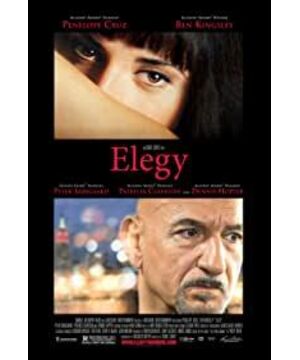When I watched the film "Elegy" directed by Isabel Coixet, the night in this coastal city in southern China was still a little cool. The sound of the piano and the calm talk of an old man made me stop. The night became a little quieter - which was nice, slightly sad, but not too sad. Yes, this is in line with the basic style that my pseudo-petty bourgeoisie wants.
The title of the movie is "Elegy". I haven't read the plot introduction. I don't know if this so-called elegy refers to an elegy about love, an elegy about sex, or an elegy about marriage. In fact, as a man, I More inclined to read it as a dirge about men, and to be more precise, I think it's a dirge about old men.
At the beginning of the movie, the old man's narration said: "Tolstoy said that the greatest surprise in a man's life is getting old..." Let's understand what happens to a man when he gets old:
A man gets old when he gets old , he will grow old, his hair will turn white or fall out, his face will droop down and become like a piece of old bark carved with years, and more importantly, he will become lifeless, his old Er will have difficulty getting an erection, or simply can't lift it anymore. However, he still has desire to see those young and beautiful bodies, and wants to linger with those bodies. For an old man, the scarier thing is that he fell in love with a young girl, and the girl loved him, but he couldn't do anything about her longing eyes...
A businessman who sold watches once said A very classic saying: "In the face of time, tenacity is the only way to survive." This businessman is right, so his watches are also selling well, but he doesn't put aside his business, after all, what he said is still a bit Feelings of a conspiracy theory.
In front of time, women are very afraid, so women need to grab something in a hurry, such as cosmetics, such as marriage, such as money. Men take name and profit, and sex. But it is very helpless. In the face of time, tenacity is actually futile, everything is actually futile, the end result of your stubborn resistance is that you are old, marriage is like a pot of clear soup, your second child can't do anything, you finally have With some money and fame, it was very close to that small mound in the wilderness (now a granite or cement slab).
After listening to director Isabel Coixet tell the story called "Elegy", the image of the old man in his 60s crying in the movie revolved around in my mind, as if lingering. An old man's elegy, there is love, desire, and of course that heavy helplessness is inevitable.
Men, and women, what can we do?
When you watch your youth ballads come to an end, and the dirges come to an end...
Perhaps there is only one thing you can do, and that is: accept it.
But the attitude is optional, because it has two kinds.
One is negative and the other is positive.
2009.5.4
View more about Elegy reviews











